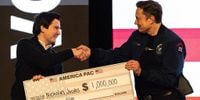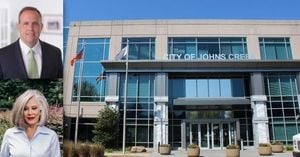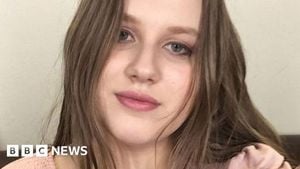A federal court decision has thrust Elon Musk and his political action committee, America PAC, into the center of a heated legal and public debate over a controversial $1 million petition lottery linked to the 2024 U.S. election. The case, McAferty v. Musk, alleges that the tech billionaire and his organization misled voters with promises of a randomized $1 million daily giveaway, when in fact, according to court testimony, the winners were handpicked to serve as spokespeople for the PAC. The ruling, delivered by U.S. District Judge Robert Pitman on August 20, 2025, allows claims of fraud and breach of contract to proceed, while dismissing a separate claim under the Texas Deceptive Trade Practices Act.
The roots of the controversy trace back to the 2024 election cycle, when Musk’s America PAC launched a high-profile campaign targeting supporters in battleground states. The campaign promised participants a shot at winning $1 million each day—provided they signed an online petition supporting free speech and the right to bear arms, and handed over personal identifying information. As reported by HuffPost and other outlets, this offer was widely promoted on social media and through multiple town halls, drawing in thousands of hopefuls eager for both the cash and the chance to support what they saw as fundamental rights.
However, the campaign’s legitimacy was called into question almost immediately. Critics, including plaintiff Jacqueline McAferty of Arizona, claimed that the so-called lottery was a ruse designed to harvest personal data and manufacture political support under false pretenses. The lawsuit alleges that, despite public assurances of a random selection process, the actual winners were chosen based on their suitability as public representatives for America PAC. According to court documents, only nine individuals received the $1 million prize, all of whom were hand-selected by the PAC.
Judge Pitman’s ruling provided a detailed account of the evidence presented. He cited the testimony of Chris Young, America PAC’s director and treasurer, who, in a hearing before a Pennsylvania judge a day before the election, admitted that the recipients were not chosen by random chance. Instead, America PAC sought out individuals who, after signing the petition, were deemed a good fit to represent the organization as spokespeople. The ruling states, “Young testified that those selected to earn $1 million were not chosen by random chance but instead America PAC looked for individuals who signed the Petition that it thought would be a good fit to represent the organization as spokespeople.”
This revelation forms the heart of the fraud and breach of contract claims. As Judge Pitman explained, “Based on this testimony, the complaint alleges that recipients were not chosen by chance but instead chosen based on their personal stories and thereafter signed a contract with America PAC to be their spokesperson.” The judge was unequivocal in dismissing the defense’s assertion that the process could still be considered random, writing, “Defendants’ argument on this ground is wholly unpersuasive.” He even referenced the Merriam-Webster definition of “randomly” to underline the point, stating, “If Defendants pre-determined the $1 million recipients based on their personal stories rather than chance, as Plaintiff has alleged, then the recipients were obviously not chosen in a way that ‘lack[ed] a definite plan, purpose, or pattern.’”
Musk’s legal team, for their part, attempted to downplay the significance of the personal identifying information collected from participants, arguing that it had no real value. Judge Pitman flatly rejected this, writing, “It is disingenuous for Defendants to argue that Plaintiff’s [personal identifying information] has no value when Defendants went through so much effort — two monetary programs, multiple town halls, several social media posts — to acquire it.”
Tom Kherkher, the Texas attorney representing McAferty, celebrated the court’s decision. In a statement to HuffPost, Kherkher said, “This ruling is the first step to vindicating our belief that voters across key battleground states never participated in a ‘random giveaway,’ but rather a scheme to harvest personal data under false pretenses.” He further described Judge Pitman’s opinion as “well-reasoned,” adding, “We are pleased with the court’s well-reasoned opinion that recognizes a reasonable person could justifiably believe they were participating in a legitimate lottery, despite the later disclosures that the winners were pre-selected spokespeople.”
The fallout from the ruling extends beyond McAferty’s case. Musk and America PAC are facing additional class-action lawsuits, including one from Joy Harvick of Arizona, who is represented by Mark Bankston—a lawyer known for his work with Sandy Hook families in their lawsuit against Alex Jones. There are also claims that Musk and his super PAC owe millions of dollars to canvassers who helped collect petition signatures during the 2024 election. These legal challenges have only intensified the scrutiny on Musk’s political activities and the growing intersection between tech billionaires and American electoral politics.
The broader public reaction to the case has been predictably polarized. Supporters of Musk argue that the petition lottery was nothing more than an aggressive promotional campaign, not unlike the sweepstakes and giveaways often used by companies and political organizations to drum up support. Detractors, however, see the campaign as emblematic of a deeper problem: the use of personal data and the promise of financial windfalls to manipulate political engagement and sway public opinion. As the case moves forward, these competing narratives are likely to shape both the legal arguments and the public discourse.
Judge Pitman’s ruling also leaves open the possibility that further details about the selection process will come to light during discovery. “The way the $1 million recipients were selected will be elucidated through discovery,” he wrote, signaling that the next phase of the lawsuit could reveal even more about the inner workings of America PAC and Musk’s involvement. Meanwhile, lawyers representing Musk and his super PAC have remained silent, declining requests for comment from the press.
The legal and political implications of the court’s decision are significant. If the fraud and breach of contract claims are upheld, it could set a precedent for how political promotions and data collection are regulated in future elections. It may also prompt lawmakers to consider new rules governing the intersection of technology, big data, and political campaigning—especially as the lines between marketing, activism, and electoral manipulation continue to blur.
For now, the future of election-related promotions remains uncertain. As the lawsuits proceed and the facts are further examined in court, the story of Musk’s $1 million petition lottery serves as a cautionary tale about the risks—and the potential consequences—of blurring the boundaries between political advocacy and promotional spectacle.




